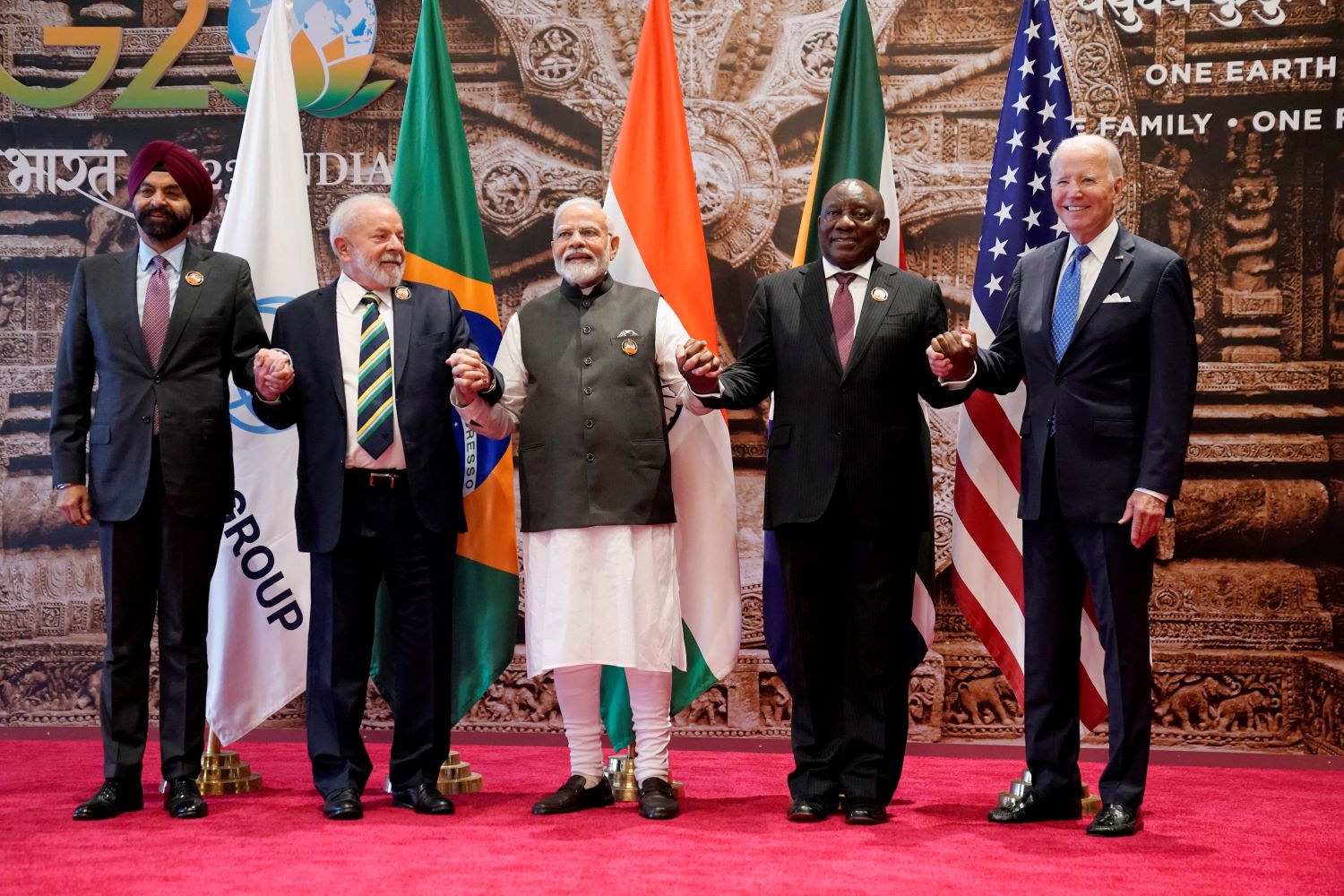Did the Group of Twenty (G20) summit in New Delhi on September 9–10, 2023, break any meaningful new ground? Five perspectives spanning G20 member and nonmember states offer varying perspectives on whether the group has entered a new phase as an effective forum for action on crucial global issues.

Rediscovering the Centrality of the Global South
As India’s G20 presidency comes to an end, it can look back with a degree of satisfaction. At a time when geopolitical tensions among major powers are running high and much of the rest of the world is despondent about the state of multilateral institutions, India not only managed to make the G20 a much more dynamic platform, but also perhaps revived faith in the ability of multilateral processes and structures to deliver by moving the global governance agenda beyond hyperpolarized discourse. It did so by putting the so-called Global South squarely at the center of the global governance agenda. In the process, it also underscored its own credentials as a leading player in the global hierarchy, one that is increasingly willing and able to shape global outcomes as opposed to merely being a passive recipient of decisions made by others.
For India, the G20 process has been one of rediscovering its potential as a responsible global stakeholder. New Delhi is today seemingly keen to provide resolutions to global challenges, announcing plans for a Global Biofuel Alliance and India-Middle East-Europe connectivity partnership and its willingness to share its own success in digital public infrastructure.. For the world at large, this process has been about coming to terms with the shifting center of gravity toward the developing world. The G20 summit and the consensus on a joint New Delhi declaration reminded the major powers of the world beyond geopolitical conflicts that is also seeking a role in global decision-making. The challenges of sustainable development, inclusive growth, climate change, food security, digital divide, emerging tech regulation, and multilateral development bank reform cannot be undertaken without the developing world at the table. The inclusion of the African Union in the G20 has fundamentally altered the character of the platform, making it more inclusive and representative of the emerging global order.
The global governance architecture has been in disarray for a long time, a reality few disagree with today. If New Delhi’s G20 succeeds in reviving even a little bit of that lost faith in existing governance structures, it would have served its purpose.
Summit Setbacks and Some Successes
Looking at the few tangible outcomes of the G20 summit, it is difficult not to be worried about the future of multilateralism. This has to do with not only what happens at G20 meetings but also what is taking place elsewhere. From a European perspective, the twenty-three countries recently applying for membership in BRICS (Brazil, Russia, India, China, and South Africa) should be as concerning as the inertia within the G20. Both factors should alert us that Russia’s and China’s global outreach—including their authoritarian propaganda—may be growing rather than declining.
Several heads of states have called the joint communiqué forged under the Indian presidency a success because all twenty members signed off to a statement that condemns the breaching of territorial lines and supports related United Nations declarations. It is indeed difficult to escape the cynicism of such a statement’s being signed by a Russian government that seized territory against the will of its neighbors and is leading a bloody war on Ukraine, which is forced to defend its territorial integrity. More problematic from a diplomatic perspective is the failure of the mostly Western countries to get additional G20 countries to apply economic sanctions against Russia to prevent the Kremlin from replenishing its war purse. If India were to join the sanctions coalition and refrain from buying Russian fossil fuels, it would constrain Russia’s financial means allowing it to continue the war.
But hope for optimism remains. With the G20 leaders’ announcement of a major international infrastructure project to connect India, the Middle East, and Europe with railways, shipping lines, high-speed data cables, and energy pipelines, some of the biggest economic players are finally providing an alternative to China’s Belt and Road Initiative in a critical region. The European Union (EU) has pledged to provide a share of financial resources included in its Global Gateway Program (amounting to €300 billion between 2021 and 2027) to support the India-Middle East-Europe Economic Corridor. The project provides the EU with an opportunity to show that it is able to leverage its economic power to defend its own foreign policy interests. It will need, though, to initiate more infrastructure initiatives in other regions of the Global South to help to build political trust.
Further progress may come from the G20 leaders’ joint pledge to triple renewables capacity by 2030 and in the decision to formally bring the African Union into the G20, strengthening their voice on climate and energy policy as well as on a more equitable distribution of wealth.
Outcomes like that are the best way to help the G20 remain a relevant format for managing North-South relations and resolving problems of a global order.
Africa’s Rising Voice
Like the BRICS summit in Johannesburg, South Africa, two weeks earlier, the just-concluded G20 summit in New Delhi is symbolically important for Africa.
At the conclusion of the BRICS summit, two African countries, Egypt and Ethiopia, joined the original five members, taking membership of the club—which also includes Argentina, Iran, Saudi Arabia, and the United Arab Emirates—to eleven.
The African Union (AU) is now a full member of the G20+, on par with the European Union. Effectively it will be represented by the AU commission chair, likely with significant support from South Africa, the only other African member.
Africans have long rightly called for more representation in global economic and political governance. Added African representation within BRICS+ and AU membership in the G20+ helps redress these deficits. It allows the continent to voice the need for much more important global governance reforms, namely, of the global financial architecture and the UN Security Council, and to agitate in the face of climate change for the prioritization of developmental issues from the perspective of the poorest and most marginalized region globally. From an African perspective, the double standards of organizations such as the G20 and Group of Seven (G7) are legion, including rhetoric on vaccines, debt sustainability, and development finance not matched by implementation.
Expanded representation will also force institutional reform and deep introspection in Africa that could see the emergence of much-needed policy coherence among the AU’s fifty-five members. For all its talk of integration, the continent is deeply divided on almost all foreign policy matters. The result is likely to complicate G20+ consensus on global matters, though it will force rich countries to confront the effects that their policies have elsewhere in the world.
The rise and voice of the Global South, a term generally derided by the West, is becoming strident. Brazil is hosting the 2024 G20+ summit, and South Africa the year after that, implying ongoing pressure and critique of the West. Even though the Global South is not united on most matters, its countries do cohere on one—a deepening frustration that the current rules-based system keeps them down and the West on top.
The response by the West to demands for reform has been akin to Russia’s defenses in eastern Ukraine. Dig in, defend, and retreat only when defeat is inevitable. Looking into the future, the time for more difficult decisions and bold leadership may be at hand—a choice between the far-reaching reforms required to save the essentials of the current global liberal system or battening down the hatches, raising walls, and withdrawing into fortress Europe and fortress North America. It is, ultimately, a choice between paying now or more later.
The Game-Changing Potential of the G20+
The circumstances that birthed the G20 in 1999—namely, the concern with seeking lasting solutions to a perennial global economic crisis—accorded it the potential of becoming a game changer. By bringing together the wealthiest countries and emerging economies and making consensus essential to deliberations, the G20 offered a potentially inclusive, even if not equitable, framework for setting global agendas and for reducing tensions of superpower rivalry.
For the Global South, where demands for global support to overcome poverty, fragility, and catastrophes are highest, the possibilities of G20-driven benefits were always going to depend on the leverage exerted by emerging economies.
It is in this regard that the summit in India reinforced the group’s game changer potential in at least two important respects. First, the admission of the AU further increased the voice of the Global South and the possibility for more inclusive agendas. Second, the priority issues and targets from the Indian summit—the need for more inclusive growth; accelerated implementation of the Sustainable Development Goals; accelerated action to mitigate climate change adversities, health emergencies, and debt vulnerabilities; reforms of multilateral development banks; and strengthening more equitable multilateral bodies, among others—are indications of how increased participation and voice by the developing world can change the agenda of global action and partnership.
It can be argued that India’s G20 presidency made a significant difference and that, hopefully, Brazil’s presidency next year will further enhance the G20’s game-changing potential. This may also go a long way in ameliorating the superpower rivalries and tensions that have continuously posed a threat not only to the effectiveness of the G20, but also to multilateral partnerships on sustainable development, human security, and prosperity.
Global Development Is Back as the Core Driver of Multilateral Summits
The New Delhi G20 summit is, in a highly symbolic way, the conclusion of the Global North’s year-long quest to geopolitically win over the Global South. Beginning in February with the Munich Security Conference, and continuing on to the May G7 summit in Hiroshima, the Global North made a concerted effort to support its collective positions on the ongoing military conflict between Russia and Ukraine. In the end, the watered-down reference to the nature of Russia’s actions in Ukraine represents pragmatism on the part of the Global North and insistence on the part of the Global South to focus global governance efforts on development.
The announcement of an economic corridor linking India, the Middle East and Europe is also as notable. Translating that vision into reality will take commitments in political will and economic resources. Nonetheless, in the wake of the restoration of diplomatic ties between Iran and Saudi Arabia, in addition to region-wide reconciliation among Arab states in the Middle East, construction of the corridor can help promote economic growth and industrial diversification in the Middle East. The rest of the world, China and other Asian economies included, stands to benefit from its success.
The admission of the AU as a permanent member of the G20, though far less dramatic than the addition of six new BRICS members weeks prior, helps put to rest concerns about the G20 turning into an expanded G7. Indeed, the prospect of a G20 for the Global North and BRICS for the Global South would only lend support to worries about emergence of a new Cold War–era structure of global governance.
With two summits to go, the G20 is about to complete its first round of rotating presidencies. A focus on economic development is what led the birth of the G20 summits. At least for now, that overall mission is being retained.











